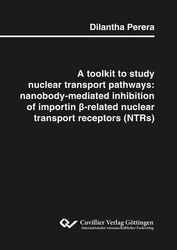| Departments | |
|---|---|
| Book Series (97) |
1381
|
| Nachhaltigkeit |
3
|
| Gesundheitswesen |
1
|
| Humanities |
2370
|
| Natural Sciences |
5407
|
| Mathematics | 228 |
| Informatics | 319 |
| Physics | 980 |
| Chemistry | 1364 |
| Geosciences | 131 |
| Human medicine | 243 |
| Stomatology | 10 |
| Veterinary medicine | 108 |
| Pharmacy | 147 |
| Biology | 835 |
| Biochemistry, molecular biology, gene technology | 121 |
| Biophysics | 25 |
| Domestic and nutritional science | 45 |
| Agricultural science | 1005 |
| Forest science | 201 |
| Horticultural science | 20 |
| Environmental research, ecology and landscape conservation | 148 |
| Engineering |
1798
|
| Common |
98
|
|
Leitlinien Unfallchirurgie
5. Auflage bestellen |
|
Advanced Search
A toolkit to study nuclear transport pathways: nanobody-mediated inhibition of importin β-related nuclear transport receptors (NTRs) (English shop)
Dilantha Perera (Author)Preview
Extract, PDF (3.9 MB)
Table of Contents, PDF (73 KB)
Eukaryotic cells are divided into a nuclear and a cytoplasmic compartment. This separates transcription from translation and makes gene expression dependent on nucleocytoplasmic transport. The members of the importin β superfamily function as shuttling nuclear transport receptors (NTRs) that recognize and actively transport cargoes through nuclear pores. An estimated 5 000 to 10 000 different human proteins are subject to active nuclear transport. Numerous cargo/NTR pairs have been identified, however, we are still far from a complete understanding as it has been very challenging to setup a systematic in vivo analysis that integrates the impact of all transport pathways.
In this study, we obtained anti-NTR nanobodies against TRN1, Xpo4, Xpo7, and CAS. Our aim was to identify nanobodies, and prepare nanobody fusions, that impede nuclear pore-passage of the targeted NTR and thus, interrupt a given transport cycle. These nanobody fusions were observed to inhibit the partition of NTR/cargo complexes into a reconstituted FG phase. We also observed that the nanobodies and nanobody fusions inhibit NTR transport in permeabilized cells.
| ISBN-13 (Hard Copy) | 9783736978478 |
| ISBN-13 (eBook) | 9783736968479 |
| Final Book Format | A5 |
| Language | English |
| Page Number | 136 |
| Lamination of Cover | glossy |
| Edition | 1. |
| Publication Place | Göttingen |
| Place of Dissertation | Universität Göttingen |
| Publication Date | 2023-08-07 |
| General Categorization | Dissertation |
| Departments |
Biochemistry, molecular biology, gene technology
|
| Keywords | eukaryotic cells, nucleus, compartmentalization, nucleocytoplasmic transport, importin, shuttling, nuclear transport receptors (NTRs), nuclear pore complex (NPC), importins, exportins, biportins, export complex, transport pathways, anti-NTR nanobodies, Transportin 1 (TRN1), Exportin 4 (Xpo4), Exportin 7 (Xpo7), CAS, nanobody fusions, impede nuclear pore passage, transport cycle, inhibitor, inhibition, NTR/cargo complexes, FG phase, NTR-meidated transport, permeabilized cells, Ran binding, transport block, nanobodies (Nbs), nucleoporins (Nups), tag-Nbs, NTR blockers, eukaryotische Zellen, Zellkern, Kompartimentierung, nukleozytoplasmatischer Transport, Kerntransportrezeptoren (NTRs), Kernporenkomplex (NPC), Nanokörperfusionen, NTR-vermeideter Transport, permeabilisierte Zellen, NTR-Blocker |
| URL to External Homepage | https://www.mpinat.mpg.de |








